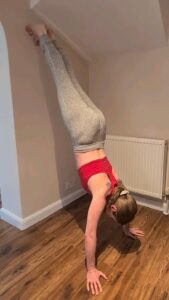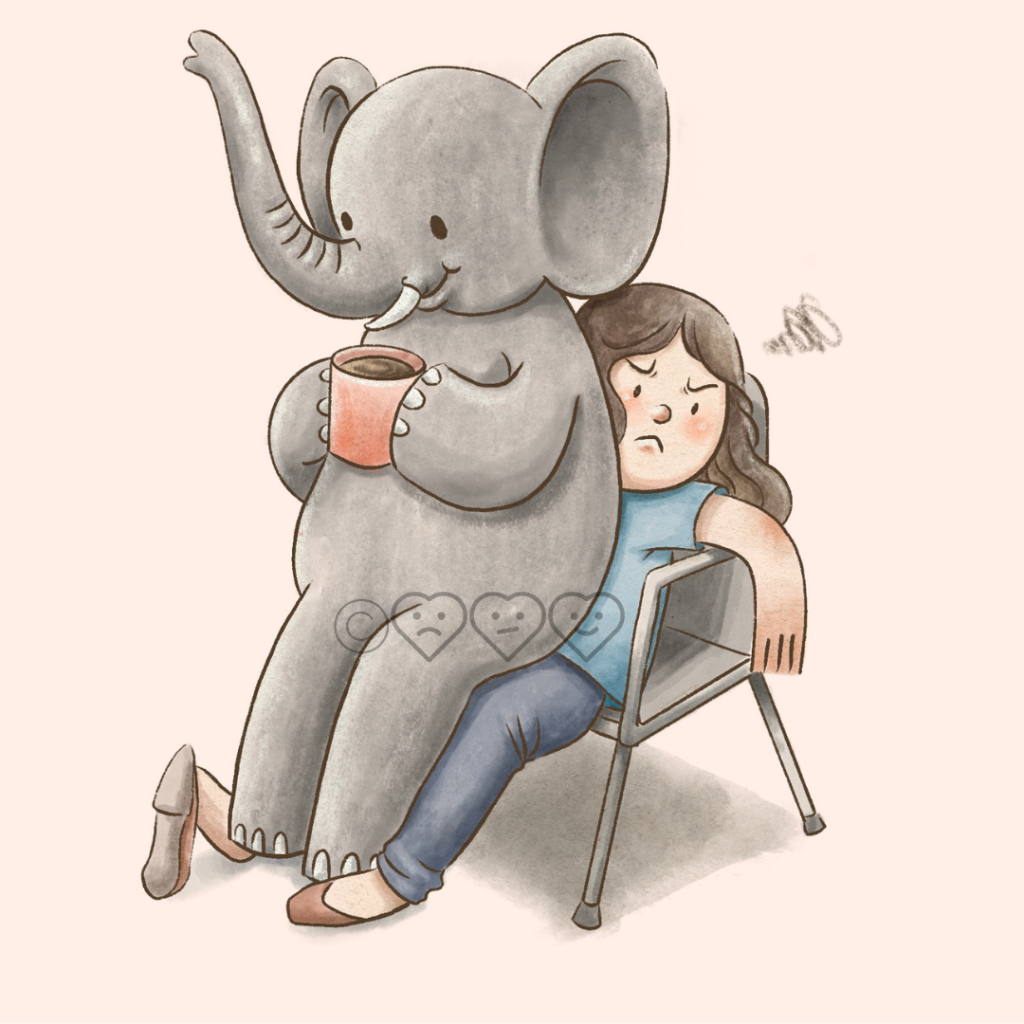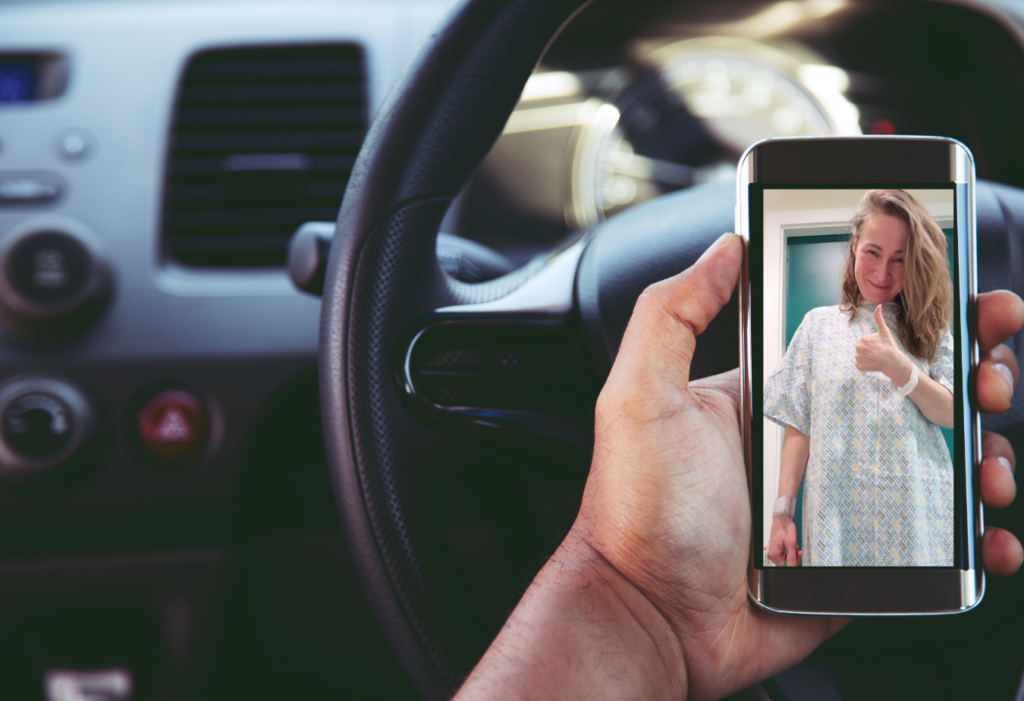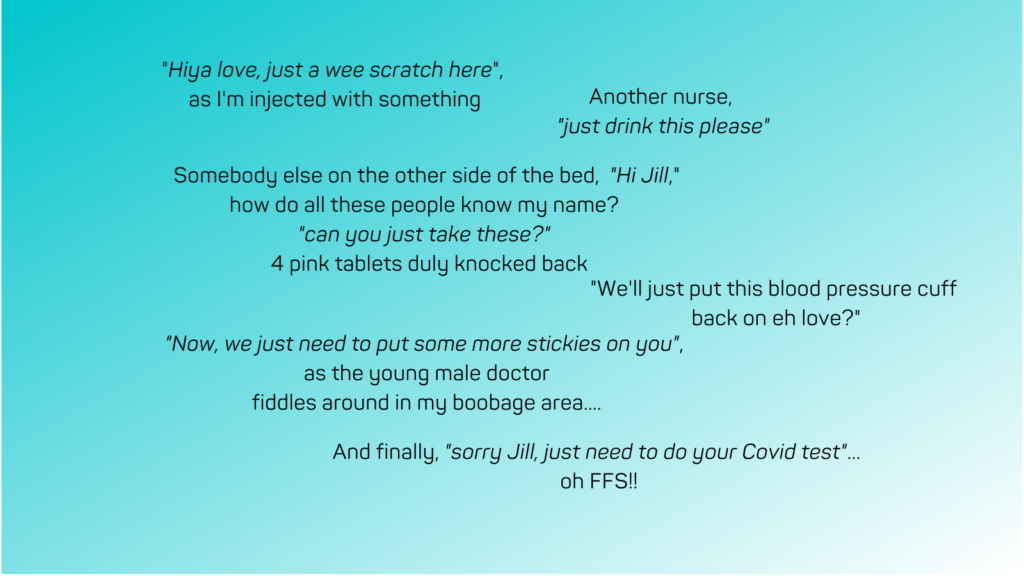1. Diary of a SCAD Heart Attack Survivor – Day Zero
Spontaneous Coronary Artery Dissection (SCAD)
A rare heart condition that can’t currently be predicted or prevented. Yet.
Day 0 – March 2021
“I am so sorry. I was wrong. You have definitely had a heart attack. Your enzyme levels show, quite categorically, that there has been damage and death to the heart tissue, which is what happens when someone has a heart attack.”
In my little, blue-curtained cubicle in the Accident & Emergency area, I stare at the senior doctor, a lop-sided smile somehow appearing on my face.
It’s like as if my face doesn’t quite know what shape to make with its’ muscles.
I am sitting on the hard, grey, plastic chair, facing the back of my little cubicle.
[To sit on the bed, facing outwards, makes me feel like an animal in the zoo, everyone walking past having a little look, or not, as is more common, but still, I don’t like sitting there on my own like an eejit.]
Plus, a guy had entered the Accident & Emergency area some time ago, and sat down to wait for treatment NOT WEARING A MASK. Kerrrist!… he is breathing directly towards me. Granted he is about 4m away, but still, I can do without this! The first time the senior doctor had seen me, she had laughed, “you really don’t want to be in here do you?!”
“Eh no. Howsabout you just ask that dude to stick a mask on love? Me and 1000’s of others have been absolutely killing themselves at their places of work to comply with Government guidelines and now I’m right in the thick of strangers who couldn’t care less. Including some of the staff whose masks are all askew”, I thought.
Thankfully, I just thought it.
And, an-oth-er reason that I wasn’t much up for sitting on the bed, was because my new middle name was ‘Denial’
“I’m not sitting on a hospital bed!
Me?! Mrs. Relatively Fit!
I was practising handstand press-ups a week ago…”

Also, I have very strong views on people who use A&E as an alternative to seeing their GP. That really ticks me off!
I was once in A&E with a broken wrist. Lady beside me starts chatting. Unfortunately.
She was “just in to pick up some antibiotics”. “We’re going abroad next week and I’ve got a bit of a tickly throat.”.…
I’d had to get up and walk away – thankfully it was my wrist that was broken not my leg – before I lambasted her on the actual purpose of A&E!
A&E is an abbreviation for Accident & Emergency, not All & Everything love.
So bearing that in mind, I am also feeling guilty for being there.
I have been triaged.
I have repeated my symptom-story to about 4 different people, over the course of the last 2 1/2 hours.
My ECG tracings, oxygen levels and blood pressure are all “fine”.
So my feelings of being a fraud had been intensifying.
I’m walking, talking and not bleeding profusely from anywhere… OK, my breathing is laboured but still, you know…. surely I don’t require the services of A&E?……
But, I do have a really, really sore chest…like an elephant is sitting on it.
And he’s been there for the last 11 hours.
Seems like said elephant is quite comfy on my wee chest. He’s not getting off any time soon.

I realise that my mobile phone is still in my hand, 6 inches away from my ear, still connected to my partner, who is sitting outside in the carpark.
Where he has been for the last 2 1/2 hours, in -1C degrees temperatures.
(Due to the Covid pandemic, only patients are allowed in to the hospital)
I had just been listening to him going slightly mad with worry and anger. (And he’s freezing cold)
“She says that you have Gastritis?!
Babe, I don’t even really know what Gastritis is, but I’m pretty sure that whatever is wrong with you, has got absolutely f*** all to do with anything you’ve eaten today”.
He is royally p****d off.
“I mean.. sheesh” his exasperation is obvious, “you had a few oatcakes and humous today – like you ALWAYS have for breakfast. I mean… NO, no, I’m ragin’, are you SURE I can’t come in?”
He is very royally p****d off.
And baltic-ly cold.
I sense that the mind of my lovely, normally super-calm, logically thinking man, who always takes everything in his stride, is feeling somewhat fried and is slowly exploding.
It was at that moment that the senior doc came back with the bombshell news, so I ask her permission to keep the call with Cameron open, so that he can hear what is being discussed.

During any discussions about your symptoms or treatment, have somebody on the phone ‘with you’, a ‘3-way’ conversation.
1. You won’t feel alone.
2. The medics will feel more comfortable in the knowledge that, whatever they are saying is being understood by someone other than a potentially, rather poorly patient.


For you the patient, it is comforting to have someone ‘there’.
For your support person, it is comforting to know what is going on.
Having your ‘support person’ in live discussion with your doctor can be absolutely invaluable.
With the benefit of hindsight, I am in denial at the news – to be honest, I remain in denial for the next day or so!
Part of me is relieved (& grateful) that the senior doctor has reviewed and apologised for her initial diagnosis of gastritis – thank heavens for Troponin blood tests eh?!
Part of me… well… as I say… DENIAL is my current default position.
The next 30mins are a blur.
To my partner, “yes, she has had a heart attack.”
To me, “No! You are not getting out tonight!”
And to both of us,
“She is/you are, the quietest heart attack patient I have seen in my medical career.”
I most definitely have to be back up on the bed now!
I am gowned up and my little cubicle becomes ever so busy.
About half a dozen medics are buzzing about, and all seem to be talking to me at the same time.

Then they’re gone.
And now I’m scared.
I am on my own.
My man has left the freezing cold carpark and gone home.
And the machine that I’m now attached to, is beeping away, whilst the blood pressure cuff periodically inflates and deflates, all serving as literal, little rhythmical reminders that actually, I’m really, not very well.
I’ve had more drugs injected, poured and pumped in to me tonight, than in my entire life, and I have no idea what they’re for or, what they’re doing for me.
Then I find out.
My heart starts going like the clappers! My arms and legs are… I would say ‘tingling’ but that sounds quite pleasant, it feels like every nerve in my body is exploding.
Is this normal? Is this what is meant to happen? Nobody has told me anything. Nobody is around.
And I can hardly get up off the bed and go find somebody whilst attached to all these machines.
And then the pain in my chest stops. I can breathe fully again. Oh halleluyah! The pain that’s been there for the last 13 hours has, at last, gone.
So that’s what the drugs are for then!
So I’m better yes?
I can go home in a whiley, yes? (I could be awarded a Bafta in Denial)
It’s only 10 minutes away from the hospital and my man is there.
The irony is that, for the first time in my life, I do have a partner who will actually be there for me. But he can’t.
Unfortunately, I ain’t going home – the nurse looks aghast when I ask her!
“Oh no Jill, you’ve had a heart attack, you’re going up to the Acute Medical Unit, and a cardiologist will see you tomorrow (It’s 1.30am right now)
Oh.
Ok.
Right then. I know I don’t normally like Mondays but this Monday…. it had defo turned out to be a bit of a random day.
But that’s OK. Tomorrow I’ll go home to my 6’4″ protector, feel his (inordinately) long arms around me and all will go back to normal.
Won’t it?
Coronary Heart Disease (CHD) kills more than twice as many women as Breast Cancer in the UK every year,
and is the single biggest killer of women worldwide.
Despite this, it’s often considered a man’s disease.
The British Heart Foundation, Women & Heart Attacks.

SCAD is when a tear or bruise develops in a coronary artery that prevents normal blood flow. This can cause a heart attack, heart failure, cardiac arrest and can be fatal.
Current data indicates:
90% of patients are female with an average age of 44-53,
– many of whom have no or few heart disease risk factors.
ECGs and O2 levels may be normal.
Assess troponin levels, repeating 4 hours later.
(NB. Trop levels may be clinically insignificant)
For information:
https://beatscad.org.uk/what-is-scad/
https://academic.oup.com/eurheartj/article/39/36/3353/4885368

